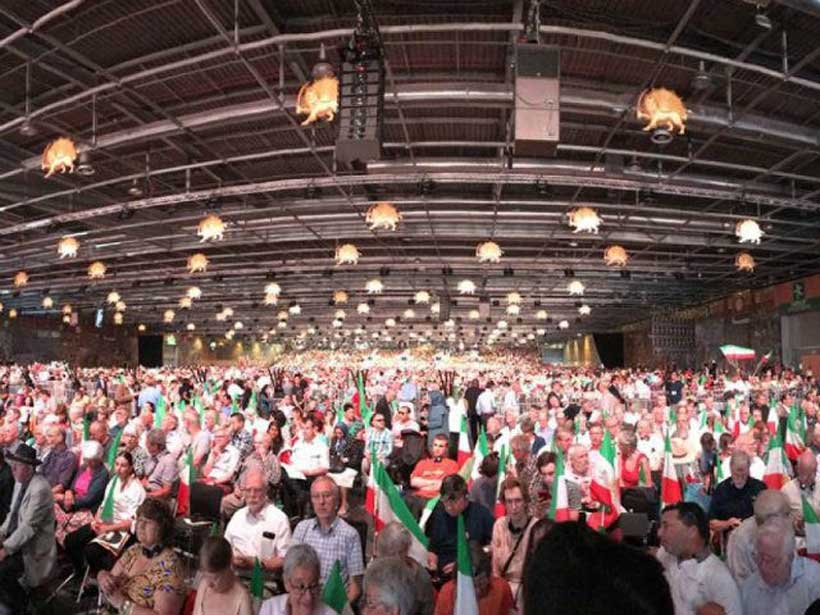Western policies toward the Islamic Republic of Iran would almost certainly be more assertive and ambitious if the international community was more broadly aware of the power and organization of Iranian activism both inside the country and throughout the global expatriate community.
Fortunately, a growing number of Western policymakers do recognize the influence wielded by Iran’s pro-democratic resistance movement, as led by Maryam Rajavi the President elect of the National Council of Resistance of Iran and its main constituent group the People’s Mojahedin Organization of Iran (PMOI or MEK). Dozens of high-profile political figures and experts in Middle Eastern affairs have taken to participating in the NCRI’s Free Iran rally, which is held near Paris each summer and attended by tens of thousands of ethnic Iranians from throughout the world.
This past June, those participants put their lives on the line by attending at a time when Iran’s domestic affairs are increasingly explosive, with growing consequences for the world at large. On the day of the Free Iran gathering, European authorities arrested two would-be bombers as they attempted to gain access to the event on the orders of a high-ranking Iranian diplomat based in Vienna.
The foiled plot underscored the Iranian regime’s flailing attempts to undermine the Iranian opposition. And it was not the only one of its kind. Months earlier, Iranian operatives were caught plotting an attack on the residence of over 2,000 MEK activists who had relocated to Albania from their former headquarters in Iraq. At the same time, federal investigators in the United States were monitoring two agents of the Iran’s Ministry of Intelligence. The subsequent criminal indictment noted that their spying would have surely resulted in attacks on US-based opposition activists if they had been left unchecked.
Finally, in October, another Iranian operative was arrested in Denmark for plotting the assassination of Iranian dissidents. This finally sparked a serious push for collective measures to confront and contain Iranian terror treats. A call to action had already emerged from France following an investigation that concluded there was no doubt about Tehran’s responsibility for the Paris plot. But in the wake of the Danish arrest and a subsequent meeting of European Union foreign ministers, the stage was seemingly set for the entire EU to adopt economic sanctions that France had already imposed on the Ministry of Intelligence and its agents.
This is, of course, an appropriate response to serious Iranian terror threats. It is made all the more sensible and potentially effective because those threats and their underlying causes are still apparent, and because it follows upon a shift toward much more assertive policies by the US government. But the EU has been notably cautious about making that shift.
The desire for continued access to Iranian markets is surely part of the reason for this. But it might also be said that the US administration is much more aware of the existence of powerful allies inside Iranian society and the expatriate population. After all, some White House officials and close confidants of the US president have been regular attendees at NCRI rallies, including the one that was nearly bombed in June.
European hesitancy is fading now that such threats have come to light and have been shown to not be isolated incidents. That hesitancy might evaporate altogether if more European policymakers were made aware of the organizational capabilities of the MEK, including its contribution to the nationwide uprising that began last December and spawned countless other protests featuring the same anti-government slogans.
Even Iran’s Supreme Leader Ali Khamenei acknowledged the MEK’s role in January, when the uprising was still in full swing. In a speech to his officials, he declared that the resistance group had spent months planning for the rapid spread of protests and the promotion of a clear message of regime change. This was a significant break from the regime’s decades-long policy of downplaying the strength and social influence of the MEK and its affiliates.
In case this is not reason enough for global policymakers to conclude that regime change is actually within reach for Iran’s pro-democratic population, the Iranian opposition foreign supporters all throughout the world are working tirelessly to highlight the success of recent and ongoing protests. As one example, Iranian communities in 50 locations throughout Europe, North America, and Australia will be hosting simultaneous conferences on Saturday 15 December to demonstrate both the threats and the opportunities that support adoption of a firm, collective Iran strategy by all Western powers.
As well as keeping a spotlight trained squarely on Iran’s recent foreign terror threats, this global teleconference will provide details about many of the protests and labor strikes that have sprung up and, in some cases, continued for months at a time, in the wake of last year’s nationwide uprising. The persistence of those demonstrations is a clear sign of the activist community’s strength and the very real prospects for the popular overthrow of the world’s foremost state sponsor of terrorism.
The Iranian terror threat is reason enough for the international community to abandon the conciliatory policies that have been prevalent for so long. Proper recognition of the Iranian democratic opposition will prove once and for all that a firm alternative is not only justified but imperative for the triumph of democracy in the Middle East.


